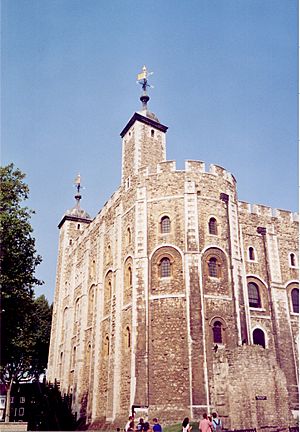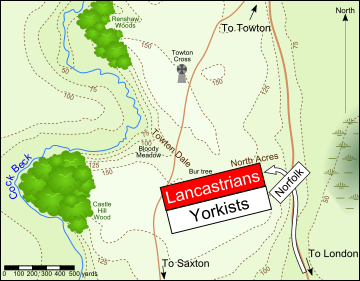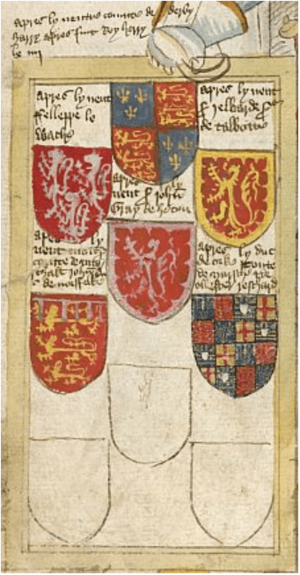John Mowbray, 3rd Duke of Norfolk facts for kids
Quick facts for kids
John Mowbray
|
|
|---|---|
| Born | 12 September 1415 Epworth, Lincolnshire, England |
| Died | 6 November 1461 (aged 46) |
| Resting place | Thetford Priory |
| Title | 3rd Duke of Norfolk (1397) |
| Tenure | 19 October 1432 – 6 November 1461 |
| Other titles |
|
| Locality | East Anglia |
| Wars and battles | |
| Offices | |
| Spouse(s) | Eleanor Bourchier |
| Issue | John de Mowbray, 4th Duke of Norfolk |
| House | Mowbray |
| Father | John de Mowbray, 2nd Duke of Norfolk |
| Mother | Katherine Neville |
John Mowbray, 3rd Duke of Norfolk, born in 1415, was an important English noble during the 1400s. He played a big part in the early years of the Wars of the Roses, a series of civil wars fought over the English throne. John Mowbray became a duke when he was just 17 years old.
As a young man, he was known for being a bit wild. He also served in the military, defending England's lands in France during the Hundred Years' War. He was even in charge of protecting the border with Scotland for a while.
John Mowbray's marriage brought him into the complicated politics of East Anglia. Here, he became a strong rival of William de la Pole. This rivalry often led to trouble. Mowbray was even sent to the Tower of London twice!
Later, he joined forces with Richard, Duke of York, who was fighting against King Henry VI. Mowbray helped Edward, Duke of York's son, win a very important battle called the Battle of Towton in 1461. He died later that year and his only son, also named John, became the next Duke of Norfolk.
Contents
Early Life and Family
John Mowbray was born on September 12, 1415. He was the only son of John de Mowbray, 2nd Duke of Norfolk, and Katherine Neville. His mother's father, Ralph Neville, 1st Earl of Westmorland, was a very powerful noble in northern England.
When John Mowbray's father died in 1432, John was only 17. This meant he was still considered a minor, or too young to fully control his lands and titles. King Henry VI took him under his care. John was placed with Humphrey, Duke of Gloucester, who was a powerful duke himself.
As a young man, John Mowbray seemed to be quite rowdy. He had a group of unruly friends. The King and his council even had to set rules for him. They told him when to go to bed and wake up. They also made him replace his wild friends with more suitable people. These new people were supposed to help him behave better. They also had to report any bad behavior back to the King's council.
Inheriting His Titles
When his father died, John Mowbray inherited the important job of Earl Marshal. However, he didn't immediately get all his father's lands. This was because his grandmother and his father's sister-in-law still held parts of the family lands. This situation made it hard for him to have much influence in certain areas, like Norfolk and Suffolk.
Right after his father's death, Mowbray tried to claim the title of Earl of Arundel. This was an old family argument. But he lost the case in Parliament in 1433.
Royal Service and Military Role
In 1436, John Mowbray joined the Duke of Gloucester in a military campaign. They went to help defend Calais, a French city held by the English, which was under attack. Mowbray brought his own soldiers to this large English army. The campaign was a success, and the attackers had to leave.
After this, Mowbray became very busy serving the King. In 1437, he was made the Warden of the Eastern March. This meant he was in charge of defending the border with Scotland for a year. He didn't have much experience in northern England, but he was paid a lot of money to fight against the Scots.
Mowbray returned to Calais in 1438 to help strengthen its defenses. He also escorted a diplomatic mission to a peace conference in 1439. He might not have agreed with the King's foreign policy, which was trying to make peace with the French.
Rivalry with William de la Pole
For many years, John Mowbray faced problems in East Anglia, where most of his lands were. William de la Pole became very powerful in this area and at court. He was Mowbray's biggest rival.
Mowbray often broke the law while fighting de la Pole. He damaged property, attacked rivals, and even made false accusations. This violent behavior caught the King's attention. Mowbray was put in prison twice, in 1440 and 1448. He was also made to pay a huge sum of money. This stopped him from going back to East Anglia to get revenge.
De la Pole was a favorite of the King, which made him very strong. Mowbray, however, didn't get much support from the King. This made it hard for Mowbray to protect his own supporters. One of Mowbray's men, Robert Wingfield, even murdered one of de la Pole's men. Mowbray managed to get royal pardons for his men. But later, Wingfield himself was imprisoned.
Mowbray's influence was often not enough to protect his followers. People expected a powerful lord like him to defend them. But Mowbray's power didn't always match his high status.
Political Challenges and the Wars of the Roses
In the 1450s, English politics became very divided. There was a lot of violence and local unrest. A rebellion in 1450, led by Jack Cade, even named Mowbray as one of the King's "natural counsellors." Mowbray helped the royal army defeat these rebels.
During another crisis, Mowbray sided with Richard, Duke of York. York felt left out of the government. Mowbray and York both disliked Edmund Beaufort, Duke of Somerset, who was the King's new favorite. Mowbray gathered his soldiers and joined York in London. They even attacked Somerset's house.
Mowbray's alliance with York was not always steady. In 1452, when York rebelled again, Mowbray was with the King. He was rewarded for his loyalty. But Mowbray continued his fight against Somerset. In 1453, when the King was sick and York was in charge, Mowbray accused Somerset of losing French lands. Somerset was then imprisoned.
The Wars of the Roses Begin

After a period of peace, the civil war started again in 1455. The King called a meeting, and the Duke of York feared it was to destroy him. York and his allies raised an army. They attacked the King's forces at the First Battle of St Albans. Mowbray tried to stay out of the fighting. However, after the battle, he threatened to hang the King's standard-bearer for fleeing. This showed that people thought Mowbray was on York's side.
Mowbray seemed to change his mind often. He didn't go to York's victory parliament in 1455. He might have gone on a religious journey instead.
The civil war restarted in 1459. The Yorkists were defeated and had to leave England. Mowbray had not taken a side. But when a parliament was called to declare the Yorkists traitors, Mowbray attended. He swore loyalty to King Henry VI.
The Yorkists returned in 1460. They defeated the King's army at the Battle of Northampton and captured the King again. Mowbray likely watched from a distance.
York then claimed the throne, which surprised his allies. Mowbray's exact reaction is unclear. But he eventually sided with the Yorkists. Perhaps he felt that King Henry's capture meant it was time to switch sides.
The Queen's army went north to fight the Yorkists. York and his allies were defeated at the Battle of Wakefield in December 1460. York and his son were killed. The Queen's army then marched south towards London. Mowbray, along with Warwick and his brother, marched north to stop them. They brought King Henry with them. But the Yorkists were defeated again at the Second Battle of St Albans in February 1461. Mowbray and Warwick left the King and went back to London.
A Key Battle: Towton
After the defeat, Mowbray joined a meeting in London. They decided to offer the throne to Edward, Earl of March, York's son. Mowbray was sent to East Anglia to prepare for war for the new King Edward.
The Lancastrian army went north. On March 29, 1461, Edward's army and the Lancastrian army met at the Battle of Towton. This was one of the longest and bloodiest battles ever fought in Britain. It was fought in terrible weather. Edward followed the Lancastrian army north with a new army, based on Mowbray's advice.
Mowbray successfully gathered soldiers. He left East Anglia on March 17, 1461. His cousin, Sir John Howard, and his forces joined Mowbray's army. Mowbray's group was likely part of the Yorkist rearguard, meaning they were behind the main army.
Mowbray was probably too sick to keep up with the main army. At Pontefract, he gave command to Howard. He knew that time was important for the Yorkists. If he was sick, he probably didn't fight himself.
Mowbray's army arrived late but at a very important moment in the battle. The Yorkists were struggling. Mowbray's arrival gave them new energy. He launched a surprise attack on the Lancastrian side, causing them to turn and run. This attack helped Edward IV win the battle.
Under the Yorkists and Death
As Earl Marshal, John Mowbray helped with the coronation of Edward IV on June 28, 1461. He received several profitable jobs in the next two months. Public order was a problem, even in East Anglia. Mowbray might have encouraged some of the unrest.
Despite supporting the new King, Mowbray faced strong opposition from local nobles in East Anglia. This happened even with the King's support.
Mowbray did not live long to enjoy the Yorkist victory. He died on November 6, 1461, at the age of 45. He was buried at Thetford Priory. His only son, John, became the next Duke of Norfolk.
His mother, Katherine, lived until about 1483. She married two more times during John's life. After his death, she married a fourth time to a much younger man. She outlived all her Mowbray children and grandchildren. Because of this, no Mowbray duke after John received his full inheritance.
Family Life
John Mowbray married Eleanor Bourchier. She was the daughter of William Bourchier, Count of Eu. Eleanor was also the sister of Henry Bourchier. John and Eleanor seemed to have a close relationship. They had one child, a son also named John. This son married Elizabeth Talbot in 1448. He was 17 when his father died and inherited the family lands four years later.
What People Thought of Him
Some historians have described John Mowbray as a "disreputable thug" or someone who was "cavalier" with other people's safety and livelihoods. They say he was very irresponsible. Others suggest that he cared a lot about honor. His job as Earl Marshal meant he needed to understand rules of chivalry.
In Plays and Stories
John Mowbray, as "Duke of Norfolk," appears as a small character in William Shakespeare's play King Henry VI, Part 3. He is shown as a supporter of the Duke of York. However, in real life, Mowbray was still loyal to King Henry at that point in the story. He also appears in the play at the Battle of Towton.
The play has been made into TV shows several times. In the 1960 BBC show An Age of Kings, Jeffry Wickham played him. In the 1965 BBC show The Wars of the Roses, David Hargreaves played him.
In an older play called The Merry Devil of Edmonton, Mowbray isn't on stage. But a funny character named Blague keeps saying, "I serve the good Duke of Norfolk." Some scholars think this play is set during King Henry VI's time. If so, the Duke of Norfolk mentioned would be John Mowbray. The play might link this Duke of Norfolk to bad behavior like poaching and thievery.
 | Misty Copeland |
 | Raven Wilkinson |
 | Debra Austin |
 | Aesha Ash |



